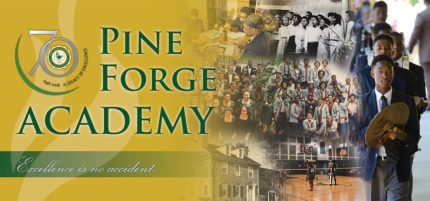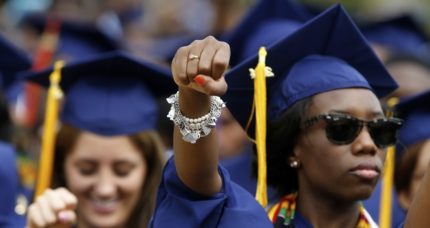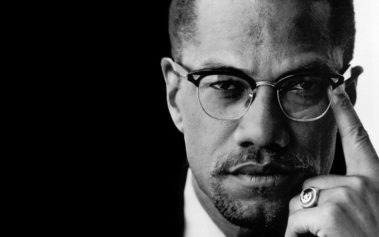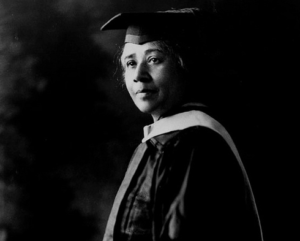
Cooper had left the U.S. to further her education in Paris when she earned her Ph.D. in 1924 at the age of 66. It made her the fourth Black woman to ever achieve such academic success, but it was everything she accomplished prior to that moment that truly made her inspirational and one of history’s greatest heroines.
Cooper wasn’t only focused on furthering her own education. Her real battle was furthering the education of her entire community.
Slavery had only recently ended when she became the head of the first public high school for Black students in the District of Columbia.
She wanted to give her young Black students the knowledge they deserved in the midst of an educational system that was only interested in training Black youth in vocational skills. What she gave her students instead was opportunity.
Cooper’s school started out as the Washington Colored High School but became known as the M Street School before being renamed Dunbar, in honor of poet Paul Laurence Dunbar.
Dunbar became a place of opportunity and it wasn’t clear if anyone at the time knew just how impactful the school would grow to be.
Dunbar scholars, much like their principal, would go on to make history.
Benjamin O. Davis, the U.S. military’s first Black general; Dr. Charles Drew, a groundbreaking pioneer in the medical field who established one of the first large-scale blood banks; and Elizabeth Catlett, a powerful artist whose work has been permanently put on display at some of the most prestigious museums in the world, were all graduates from Dunbar.
They are only a handful of the school’s iconic graduates.
Cooper proved to be a living example of what happens when students are pushed to their highest potential, even when governing bodies had set such low expectations for them.
Cooper blatantly disregarded the school district’s all-white, all-male Board of Education that insisted she needed to focus on teaching her students basic math and vocational skills in belief that these skills would be more useful to them.
The assumption was that these Black people would only go on to live a life of labor and the classic literature and complex mathematics that Cooper boasted in her classroom would never play a part in their futures.
Unlike the group of white males, Cooper always knew her people would one day be making decisions that would impact their community and their country.
“She thought [vocational skills were] fine and admirable,” said Alison Stewart, a journalist and the author of First Class: The Legacy of Dunbar, America’s First Black Public High School, according to NPR. “But not at the expense of helping these Negro and Colored students be all that they could be intellectually.”
That very topic was at the center of national discourse within the Black community.
Should Black people be learning the type of hands-on skills that would lead to more immediate employment or should they be diving into classic literature and seeking higher knowledge?
W.E.B. Dubois maintained the latter while Booker T. Washington advocated for the former.
Dubois believed that it would be the Black community’s “talented tenth” that would be able to lead the community forward and reach equality.
“Washington, ever-conscious that slavery had only recently ended, wanted to concentrate on the other 90 percent, who would need jobs to feed and clothe their families,” NPR reports. “Domestic work and skilled manual labor, he believed, would do that.”
Cooper had formed a friendship with both of the iconic Black leaders but she, too, believed that education would be extremely vital in the progression of her community.
From childhood, Cooper had garnered a serious appreciation and admiration for education.
She was born into slavery as the daughter of an enslaved woman and the white man that owned them both.
She became an avid learner while attending an Episcopal-run private school at home before going on to attend Oberlin College in Ohio.
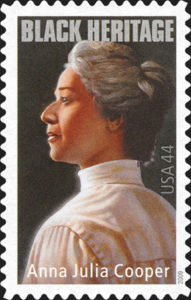
She was known for her patience with students, especially low-income students who didn’t have the same educational exposure that others may have had.
Eventually her hard work would be partially tarnished by scandal.
Cooper was accused of having a “sexual affair with her young adult foster son,” Dana Goldstein, the author of The Teacher Wars: A History of America’s Most Embattled Profession, told NPR.
Despite the lack of any evidence and obvious malicious intentions, the controversy forced Cooper to step down and leave her school behind.
That’s when she took off to Paris and presented a stunning dissertation in French that explored attitudes toward slavery after the Haitian rebellion, officially gaining her groundbreaking Ph.D. from the University of Paris-Sorbonne in 1924.
As time passed, so did the scandal, and Cooper returned to the school that she led to academic success.
Cooper passed away in 1964 at the age of 105 but her legacy resonates throughout the halls of Dunbar today as well as Black communities across the country.
The very things Cooper fought for, those radical ideas of education, are now commonplace in modern education, Goldstein adds.
Cooper also realized that “children’s performance at school is impacted by their home lives”—a concept that even modern researchers today are still exploring, proving just how far ahead of her time Cooper really was.
